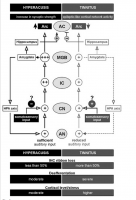Very interesting 2013 article on tinnitus and hyperacusis. The article's highlights are summarized as follows, quoted from the authors:
Of particular interest is a graphic the authors include that hypothesize differences between tinnitus and hyperacusis:

For explanation of the figure, please see the article.
References:
http://www.ncbi.nlm.nih.gov/pubmed/24012803/
http://www.sciencedirect.com/science/article/pii/S0301008213000804
- Hearing disorders can be linked with cochlear damage without an elevation of hearing thresholds.
- Tinnitus and hyperacusis may be associated with various degrees of deafferentation not necessarily linked with an elevation of hearing thresholds
- Tinnitus may not necessarily be linked with cortical reorganization.
- Tinnitus and hyperacusis may be associated with differences in central gain.
- Tinnitus and hyperacusis may be associated with abnormal stress effects that may act in the periphery of the cochlea.
Advances in the neurobiology of hearing disorders: recent developments regarding the basis of tinnitus and hyperacusis.
Knipper M1, Van Dijk P, Nunes I, Rüttiger L, Zimmermann U.
Author information
Abstract
The prevalence of hearing problems in the Western world has, due to aging of the population, doubled over the past 30 years. Thereby, noise-induced hearing loss is an important factor that worsens over time in addition to age-related hearing loss. Hearing loss is usually measured as an elevation of a person's hearing thresholds, expressed in decibel (dB). However, recent animal studies have unraveled a type of permanent cochlear damage, without an elevation of hearing thresholds. This subtle damage is linked to a permanent and progressive degeneration of auditory fibers that occurs in association with damage of the inner hair cell synapse. Afferent neuronal degeneration has been suggested to be involved in hyperacusis (over sensitivity to sound) and tinnitus (a phantom sound percept). Hyperacusis and tinnitus are potentially devastating conditions that are still incurable. The main risk factors to develop tinnitus or hyperacusis are hearing loss, social stress and age. Both tinnitus and hyperacusis have been discussed in the context of a pathological increased response gain in subcortical brain regions as a reaction to deprivation of sensory input. Novel studies confirm the involvement of peripheral deafferentation for tinnitus and hyperacusis, but suggest that the disorder results from different brain responses to different degrees of deafferentation: while tinnitus may arise as a failure of the brain to adapt to deprived peripheral input, hyperacusis may result from an 'over-adaptive' increase in response gain. Moreover, moderate and high stress levels at the time of acoustic trauma have been suggested to play a pivotal role in the vulnerability of the cochlea to acoustic damage and therefore for the development of tinnitus and hyperacusis.
Knipper M1, Van Dijk P, Nunes I, Rüttiger L, Zimmermann U.
Author information
Abstract
The prevalence of hearing problems in the Western world has, due to aging of the population, doubled over the past 30 years. Thereby, noise-induced hearing loss is an important factor that worsens over time in addition to age-related hearing loss. Hearing loss is usually measured as an elevation of a person's hearing thresholds, expressed in decibel (dB). However, recent animal studies have unraveled a type of permanent cochlear damage, without an elevation of hearing thresholds. This subtle damage is linked to a permanent and progressive degeneration of auditory fibers that occurs in association with damage of the inner hair cell synapse. Afferent neuronal degeneration has been suggested to be involved in hyperacusis (over sensitivity to sound) and tinnitus (a phantom sound percept). Hyperacusis and tinnitus are potentially devastating conditions that are still incurable. The main risk factors to develop tinnitus or hyperacusis are hearing loss, social stress and age. Both tinnitus and hyperacusis have been discussed in the context of a pathological increased response gain in subcortical brain regions as a reaction to deprivation of sensory input. Novel studies confirm the involvement of peripheral deafferentation for tinnitus and hyperacusis, but suggest that the disorder results from different brain responses to different degrees of deafferentation: while tinnitus may arise as a failure of the brain to adapt to deprived peripheral input, hyperacusis may result from an 'over-adaptive' increase in response gain. Moreover, moderate and high stress levels at the time of acoustic trauma have been suggested to play a pivotal role in the vulnerability of the cochlea to acoustic damage and therefore for the development of tinnitus and hyperacusis.
Of particular interest is a graphic the authors include that hypothesize differences between tinnitus and hyperacusis:

For explanation of the figure, please see the article.
References:
http://www.ncbi.nlm.nih.gov/pubmed/24012803/
http://www.sciencedirect.com/science/article/pii/S0301008213000804

 Member
Member

